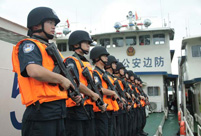 'Jin' named the word of the year by cross-strait netizens
'Jin' named the word of the year by cross-strait netizens Chinese scientific expedition goes to build new Antarctica station
Chinese scientific expedition goes to build new Antarctica station
 Chinese naval escort fleet conducts replenishment in Indian Ocean
Chinese naval escort fleet conducts replenishment in Indian Ocean 17th joint patrol of Mekong River to start
17th joint patrol of Mekong River to start China's moon rover, lander photograph each other
China's moon rover, lander photograph each other Teaming up against polluters
Teaming up against polluters
BEIJING, Dec. 25 -- China, according to reports, may become the largest express delivery service country in 2014. But the fast growing express delivery sector still has many loopholes, as was evident last month when packages soaked in a deadly chemical killed one recipient in Shandong and left seven critically ill.
The growth of China's express delivery industry has been amazing. In the first 11 months of this year, the industry had delivered 8.12 billion packages, second only to the United States. The industry has grown at such a fast pace because of the astonishing development of e-commerce coupled with China's gift-giving tradition. The volume of e-commerce has grown from 10 billion yuan ($1.65 billion) in 2000 to about 10 trillion yuan in 2013, a 1,000 times increase.
According to data from Taobao and Tmall, on Nov 11 alone, more than 70 million packages were wrapped for delivery. Alibaba Group's figure show that the about 7 million shops on Tmall and Taobao need to send 5 million new packages every day. E-commerce indeed has been the greatest driving force for the express delivery industry.
China's traditional gift-giving culture, too, has played a big role in the industry's stunning growth. Since gifts, especially during festivals, carry great cultural value in China, people in cities quite naturally choose express delivery agencies to send them to their loved ones. The changes in people's living and working styles, too, have helped the express delivery business to boom.
The industry today is more competitive than ever, with courier agencies opening more branches in more cities across the country to fight for a bigger market share. Behind this booming market, however, lie potential risks.
The lure of winning a larger market share - and conversely the fear of losing customers - has prevented the delivery agencies from raising their charges. The result: express delivery charges have not risen for years, a rare market phenomenon considering that inflation and higher labor costs have pushed up prices of almost all products. That means the industry, owing to increased operational and labor costs, is facing a very tight cash flow.
To overcome the above constraints, some delivery agencies have chosen to invest more funds into their business while others have introduced franchise operations or raised their business commission.
The problem is that, once the national delivery demand slows down, such large-scale expansion could cause a break in the capital chain and create crisis in the industry.

 People prepare for upcoming 'Chunyun'
People prepare for upcoming 'Chunyun'  Highlights of Beijing int'l luxury show
Highlights of Beijing int'l luxury show Record of Chinese expressions in 2013
Record of Chinese expressions in 2013 China's moon rover, lander photograph each other
China's moon rover, lander photograph each other 17th joint patrol of Mekong River to start
17th joint patrol of Mekong River to start Spring City Kunming witnesses snowfall
Spring City Kunming witnesses snowfall Heritage of Jinghu, arts of strings
Heritage of Jinghu, arts of strings Weekly Sports Photos
Weekly Sports Photos PLA elite units unveiled
PLA elite units unveiled  China's stealth fighters hold drill over plateau
China's stealth fighters hold drill over plateau Chinese navy hospital ship's mission
Chinese navy hospital ship's mission  "Free lunch" program initiated in NW China
"Free lunch" program initiated in NW China  Rime scenery in Mount Huangshan
Rime scenery in Mount Huangshan DPRK's Kaesong Industrial Complex
DPRK's Kaesong Industrial Complex 'Jin' named the word of the year
'Jin' named the word of the year Day|Week|Month